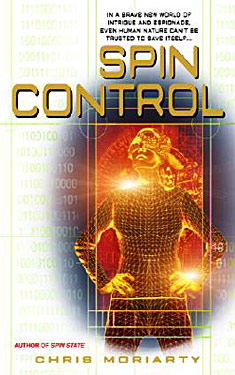Chris
Moriarty
Completed 2/8/2020,
Reviewed 2/8/2020
4 stars
I liked this
book without really understanding what was going on. Like most books in the cyberpunk subgenre of
science fiction, the concepts usually lose me.
I guess I just don’t have the mind for them. It’s kind of like being a luddite while
working in the computer industry, which I am, and in which I do. Still, I really liked reading this book. The prose was terrific. It was very readable. My problem though was that the author threw around
a ton of jargon that I only partially comprehended. This is the second book of a series, though
it’s not a direct sequel to the first.
Still, I wonder if I would have understood more if I read the first
book, or if I would have simply stopped at the first book if it had the same
complexity of this one. I read this
because it is on the Worlds Without End LGBTQ Spec. Fic. Resource, having been
nominated for a Gaylactic Spectrum Award in 2007.
 The plot is
very complicated. I know I only have just
a light grasp of it, but here’s the gist of what I gathered. In the far future, clones, Ais, and some
regular humans live on a Ring around the Earth, where technology continues to
advance. They send clones into space to
travel to other planets to terraform. The
people who stayed on Earth are mostly religious fanatics still fighting wars over
the same old issues as well as for water, the rarest resource on the
planet. As punishment, the civilization
on the Ring has a technology embargo on the Earth, keeping them from advancing
technologically.
The plot is
very complicated. I know I only have just
a light grasp of it, but here’s the gist of what I gathered. In the far future, clones, Ais, and some
regular humans live on a Ring around the Earth, where technology continues to
advance. They send clones into space to
travel to other planets to terraform. The
people who stayed on Earth are mostly religious fanatics still fighting wars over
the same old issues as well as for water, the rarest resource on the
planet. As punishment, the civilization
on the Ring has a technology embargo on the Earth, keeping them from advancing
technologically.
Arkady is Syndicate
clone who has been on a mission to terraform a planet called Novalis. There he acquired a genetic weapon that could
possibly wipe out humanity. The Syndicate
sends him to Earth and Israel is not trying to buy the weapon, but sell it, and
Arkady, to the highest bidder. This
weapon, though, has more far-reaching consequences than anyone ever
imagined. Among the bidders are
Catherine Li, a former officer for the Peacekeepers, and her lover, Roland
Cohen, the longest-lived AI. They not only
share their lives, but their minds, though their relationship is rather rocky. There are other bidders, and no one is above
manipulation and violence to get their hands on Arkady.
I have to
admit that even though I didn’t get the plot, I applaud Moriarty for its
complexity. Normally, I would have been
very frustrated with it. For some
reason, I wasn’t. I was intrigued,
though I never really got all the ins and outs of it. There were times where I didn’t know what I
was reading, but it read well, if that makes sense. And there were an awful lot of characters who
I could never tell whether they were good or bad, which I believe was probably
the point. Moral ambiguity to the
max. The only character I really had an understanding
of was Arkady. Being developed and
raised by his Syndicate, he didn’t know much about the ways of regular humans. Often, he was confused about what was going on
around him, which I really identified with.
The world-building
was quite tremendous. I was amazed at
Moriarty’s grasp on her creation, that is, a world so far in the future but
still has the same old conflicts, particularly, the Israeli-Palestinian
conflict, religious fanaticism, the dominance of corporations, and the eroding
of the US. This kind of goes hand in hand
with my amazement at her prose. She so
expertly described everything in this world that I really felt a part of it,
even when the plot was lost on me.
The book
falls in the LGBTQ category because the clones, like Arkady, only partner with
other clones from their same Syndicate. Normally,
the clones from the same tank all have the same name. But Arkady’s clone-mate is named Arkasha,
though they are made from the same genetic material. We know of their relationship because both
were sent on the same mission to the planet Novalis. The format of the book has the chapters
alternating between the plot on Earth and the past mission to Novalis where
Arkady acquired the weapon.
I give this
book four stars out of five because I realize it is a really good, well-developed,
and executed book. Normally, when the
plot is so convoluted that I can’t follow it, I give the book two or three
stars. But this time, I knew I was
reading something quite amazing, even though I didn’t get it. So how would I recommend this book? I’d suggest it for people who are into
cyberpunk and/or espionage novels and aren’t afraid of a lot of characters,
acronyms and new jargon.
No comments:
Post a Comment